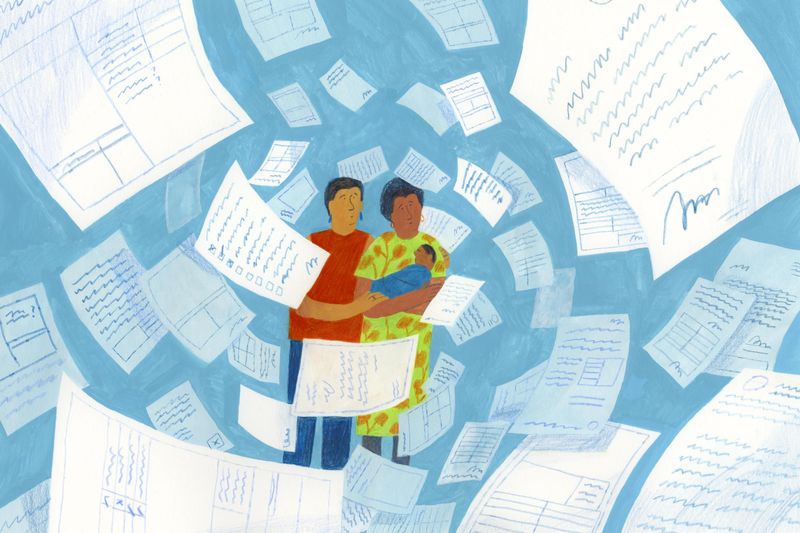
Series: Birth Rights
Investigating Florida’s NICA Program
This article was produced in partnership with the Miami Herald, which is a member of the ProPublica Local Reporting Network.
The day after the Florida Legislature passed a bill to reform a state program for brain-damaged children, its executive director rolled out a host of additional changes that went beyond those mandated by lawmakers.
In doing so, Kenney Shipley, executive director of NICA, the Birth-Related Neurological Injury Compensation Association, embraced some of the same changes she had opposed in past years. The program she has managed for nearly two decades is supposed to provide comprehensive services for Florida families whose children suffered catastrophic brain damage at the time of birth.
A series of reports last month by the Miami Herald and ProPublica documented how some parents felt NICA was hoarding money while depriving them and their children of services and support — from wheelchairs to modified vans to therapies that could improve their children’s lives.
The Legislature took notice. As lawmakers adjourned late last week, they passed a bill to overhaul the program and sent it to Gov. Ron DeSantis for his signature. NICA, which has stockpiled nearly $1.5 billion in assets, will also undergo an audit and inspection by the state’s chief financial officer, as well as a separate investigation initiated by the speaker of the House, Chris Sprowls.
On Friday, Shipley emailed a note to NICA families stating: “You will immediately get additional benefits and services you have long deserved.”
Shipley, who has directed NICA since 2002, said the program would be “improving and expediting” its reimbursement process, which some parents said is slow, cumbersome and sometimes left them responsible for out-of-pocket expenses. Some parents said they are left to guess what NICA does and does not cover.
Shipley said the program also will implement a new process by which families will be told in writing which requests for benefits have been denied — and why.
One parent asked why NICA waited until lawmakers insisted before embracing reform.
Some of the initiatives announced by Shipley — streamlining the reimbursement process, for example — don’t require permission from lawmakers. They could have been implemented years ago.
“I feel like they hide behind the legislation, where they could be doing so much more for us,” said Ashley Hammer, whose 19-year-old stepson, Brennan, was accepted into NICA in 2003.
“The bill is a great step in the right direction. It’s long overdue. But from the email that was sent out, I feel like Kenney is patting herself on the back, which is undeserved,” Hammer added. “With NICA, it’s literally an act of Congress for us to even know what we’re allowed to get.”
Reporters asked NICA on Tuesday what prevented administrators from reforming the program sooner — why NICA had for years resisted entreaties from parents to make the program easier to navigate. In an email, the program declined to answer, except to say that NICA “supports and appreciates what the Florida Legislature has done this year to help us enhance benefits for our families.”
“Many of these changes would have been difficult or impossible to achieve without legislative authorization and the NICA Fund’s recent financial gains,” the program said, without specifying why administrators needed legislative support to begin offering an explanation of benefits for families, or to loosen the reimbursement process.
According to the agency’s own records, NICA’s financial gains began well before the recent run-up in the stock market. NICA’s assets have doubled since 2006.
“We are better positioned now than ever before to take significant additional steps forward over the next year for the well-being of the children in the program,” the program added.
Jackie Amorim, whose 3-year-old daughter, Vera, was accepted into NICA in 2019, said she is grateful that Shipley is going to make the claims process easier for families. But she also wants NICA to cover alternative therapies for children that may not be considered medically necessary but that can bring some joy into what is often a lonely and shuttered existence.
“Unless you understand the psychology of being a caretaker for a child that should have had a future, you cannot understand how much we would give just for a good day. And so much of the culture is focused on, ‘But do they need it?’ And we are saying yes, and they are saying no, and if you understood what my life was like, if you understood how hard we work for a smile from Vera — she only smiles a few times a week — and then you’re telling me I can’t have the thing that would make her smile. That’s heartbreaking to us.”
Parents will still be required to submit letters of medical necessity, denials from health insurers and other paperwork for reimbursement of medical services and devices. But beginning July 1, Shipley said, NICA will include a written “explanation of benefits” report “with each payment and in response to any denied request.”
That is not something that was required in the bill that the governor still must sign.
Shipley’s embrace of the change is a marked turnaround from her past opposition to the Florida Legislature’s efforts to reform NICA. Shipley had opposed providing detailed explanations to families when lawmakers last proposed changes to NICA in 2013.
That year, Shipley sent an email to lobbyists regarding a bill that would make the program more responsive to families.
“Most of this is pretty silly,” she wrote, “since we are not here or funded to ‘promote the best interest’ of the children.” That bill died in the Legislature.
Lawmakers created NICA in 1988 to address claims from obstetricians that rising medical malpractice insurance premiums were driving doctors from the state. The legislation precludes most parents from suing their doctor and hospital in the event their child is born with severe brain damage as the result of oxygen deprivation or asphyxia during delivery.
In exchange for forfeiting the right to sue, parents were given a $100,000 “award” upfront and the promise of “medically necessary” care for the life of their child.
To qualify for the program, children must weigh at least 5.5 pounds at birth, be substantially impaired both physically and cognitively, and be delivered at a hospital by a doctor who paid an annual $5,000 assessment to participate in NICA.
The legislation passed this year marks the first significant change to the NICA statute in 33 years. It raises the parental award to $250,000 and increases the program’s death benefit, a stipend for burial and funeral expenses, from $10,000 to $50,000 — both retroactive to families currently in the program. The increased death benefit is also retroactive to all families whose children died since NICA’s inception.
The legislation would also reform the program’s governance. Lawmakers added two seats to NICA’s board of directors, which currently includes only doctors, a hospital administrator and insurance industry representatives. New members will include the parent of a NICA child and an advocate for disabled children. In addition, a seat designated for a Florida “citizen” will exclude anyone affiliated with any group represented on the board. The bill also provides $10,000 annually in mental health services for the immediate family of covered children, increases from $30,000 to $100,000 NICA’s coverage for home modifications, and requires the program to provide handicapped-accessible transportation for children with wheelchairs, regardless of NICA’s prior age and weight restrictions.
And the legislation requires NICA to be more transparent: If the bill is signed into law, NICA will be required to report each Jan. 1 a summary of reimbursement disputes and resolutions. NICA also must issue an annual report each Nov. 1 to the governor, chief financial officer, House speaker and Senate president. And the program must list on its website the names and terms of each board member and executive staff member, the compensation for each NICA employee and attorney fees spent to fight claims.
Hammer said she is grateful for the reforms. But she is taking a wait-and-see approach toward the explanation of benefits promised by Shipley, and she wishes lawmakers had kept in the legislation some of the language that required NICA to cover dental care and create a portal that would encourage networking by families in the program.
“I feel like if we as parents got together and formed our own coalition, we would be in a much better place,” Hammer said. “The legislation is a good step in the right direction.”
She added: “I don’t think we’re done.”





